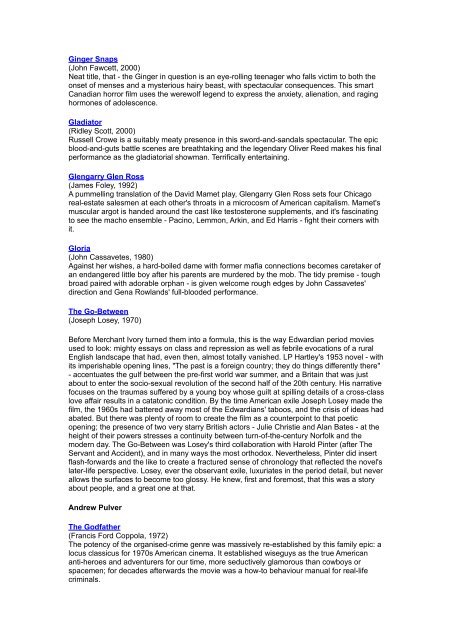Ace in the Hole - MatthewHunt
Ace in the Hole - MatthewHunt
Ace in the Hole - MatthewHunt
Create successful ePaper yourself
Turn your PDF publications into a flip-book with our unique Google optimized e-Paper software.
G<strong>in</strong>ger Snaps<br />
(John Fawcett, 2000)<br />
Neat title, that - <strong>the</strong> G<strong>in</strong>ger <strong>in</strong> question is an eye-roll<strong>in</strong>g teenager who falls victim to both <strong>the</strong><br />
onset of menses and a mysterious hairy beast, with spectacular consequences. This smart<br />
Canadian horror film uses <strong>the</strong> werewolf legend to express <strong>the</strong> anxiety, alienation, and rag<strong>in</strong>g<br />
hormones of adolescence.<br />
Gladiator<br />
(Ridley Scott, 2000)<br />
Russell Crowe is a suitably meaty presence <strong>in</strong> this sword-and-sandals spectacular. The epic<br />
blood-and-guts battle scenes are breathtak<strong>in</strong>g and <strong>the</strong> legendary Oliver Reed makes his f<strong>in</strong>al<br />
performance as <strong>the</strong> gladiatorial showman. Terrifically enterta<strong>in</strong><strong>in</strong>g.<br />
Glengarry Glen Ross<br />
(James Foley, 1992)<br />
A pummell<strong>in</strong>g translation of <strong>the</strong> David Mamet play, Glengarry Glen Ross sets four Chicago<br />
real-estate salesmen at each o<strong>the</strong>r's throats <strong>in</strong> a microcosm of American capitalism. Mamet's<br />
muscular argot is handed around <strong>the</strong> cast like testosterone supplements, and it's fasc<strong>in</strong>at<strong>in</strong>g<br />
to see <strong>the</strong> macho ensemble - Pac<strong>in</strong>o, Lemmon, Ark<strong>in</strong>, and Ed Harris - fight <strong>the</strong>ir corners with<br />
it.<br />
Gloria<br />
(John Cassavetes, 1980)<br />
Aga<strong>in</strong>st her wishes, a hard-boiled dame with former mafia connections becomes caretaker of<br />
an endangered little boy after his parents are murdered by <strong>the</strong> mob. The tidy premise - tough<br />
broad paired with adorable orphan - is given welcome rough edges by John Cassavetes'<br />
direction and Gena Rowlands' full-blooded performance.<br />
The Go-Between<br />
(Joseph Losey, 1970)<br />
Before Merchant Ivory turned <strong>the</strong>m <strong>in</strong>to a formula, this is <strong>the</strong> way Edwardian period movies<br />
used to look: mighty essays on class and repression as well as febrile evocations of a rural<br />
English landscape that had, even <strong>the</strong>n, almost totally vanished. LP Hartley's 1953 novel - with<br />
its imperishable open<strong>in</strong>g l<strong>in</strong>es, "The past is a foreign country; <strong>the</strong>y do th<strong>in</strong>gs differently <strong>the</strong>re"<br />
- accentuates <strong>the</strong> gulf between <strong>the</strong> pre-first world war summer, and a Brita<strong>in</strong> that was just<br />
about to enter <strong>the</strong> socio-sexual revolution of <strong>the</strong> second half of <strong>the</strong> 20th century. His narrative<br />
focuses on <strong>the</strong> traumas suffered by a young boy whose guilt at spill<strong>in</strong>g details of a cross-class<br />
love affair results <strong>in</strong> a catatonic condition. By <strong>the</strong> time American exile Joseph Losey made <strong>the</strong><br />
film, <strong>the</strong> 1960s had battered away most of <strong>the</strong> Edwardians' taboos, and <strong>the</strong> crisis of ideas had<br />
abated. But <strong>the</strong>re was plenty of room to create <strong>the</strong> film as a counterpo<strong>in</strong>t to that poetic<br />
open<strong>in</strong>g; <strong>the</strong> presence of two very starry British actors - Julie Christie and Alan Bates - at <strong>the</strong><br />
height of <strong>the</strong>ir powers stresses a cont<strong>in</strong>uity between turn-of-<strong>the</strong>-century Norfolk and <strong>the</strong><br />
modern day. The Go-Between was Losey's third collaboration with Harold P<strong>in</strong>ter (after The<br />
Servant and Accident), and <strong>in</strong> many ways <strong>the</strong> most orthodox. Never<strong>the</strong>less, P<strong>in</strong>ter did <strong>in</strong>sert<br />
flash-forwards and <strong>the</strong> like to create a fractured sense of chronology that reflected <strong>the</strong> novel's<br />
later-life perspective. Losey, ever <strong>the</strong> observant exile, luxuriates <strong>in</strong> <strong>the</strong> period detail, but never<br />
allows <strong>the</strong> surfaces to become too glossy. He knew, first and foremost, that this was a story<br />
about people, and a great one at that.<br />
Andrew Pulver<br />
The Godfa<strong>the</strong>r<br />
(Francis Ford Coppola, 1972)<br />
The potency of <strong>the</strong> organised-crime genre was massively re-established by this family epic: a<br />
locus classicus for 1970s American c<strong>in</strong>ema. It established wiseguys as <strong>the</strong> true American<br />
anti-heroes and adventurers for our time, more seductively glamorous than cowboys or<br />
spacemen; for decades afterwards <strong>the</strong> movie was a how-to behaviour manual for real-life<br />
crim<strong>in</strong>als.


